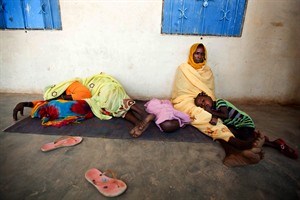
FILE - In this Monday, May 13, 2013 file photo released by the United Nations African Union Mission in Darfur (UNAMID), Sick women and children wait to be treated at a hospital in El Sereif village, North Darfur, Sudan. Global efforts to curb malaria are stalling after a drop in funds to buy bed nets, according to the latest report from the World Health Organization released Wednesday Dec. 11, 2013. For the second year in a row, WHO noted a dramatic decline in the number of bed nets given out to protect people from the mosquitoes that spread malaria. In 2010, 145 million bed nets were distributed; that fell to 92 million in 2011 and 70 million last year. (AP Photo/UNAMID, Albert Gonzalez Farran, File)
December 11, 2013 - 8:03 AM
LONDON - Global efforts to curb malaria are stalling after a drop in funds to buy bed nets, according to the latest report Wednesday from the World Health Organization.
For the second year in a row, WHO noted a dramatic decline in the number of bed nets given out to protect people from the mosquitoes that spread malaria. In 2010, 145 million bed nets were distributed; that fell to 92 million in 2011 and 70 million last year.
"Victory over this ancient foe is still a long way off," WHO Director-General Dr. Margaret Chan wrote in the report. WHO says it has less than half of the $5.1 billion it needs for its malaria efforts.
Last month, the Global Fund to Fight AIDS, Tuberculosis and Malaria, a leading international donor, temporarily stopped buying bed nets from the two top manufacturers after a corruption scandal.
Malaria causes symptoms including fever, chills and vomiting and can kill if not treated early. The parasitic disease mainly strikes children under 5 in Africa. WHO estimated there were about 207 million cases of malaria and 627,000 deaths worldwide last year, with 80 per cent of the cases in Africa.
But those numbers come with a big disqualifier; Credible figures are only available for countries representing about 14 per cent of malaria cases worldwide.
WHO said it has so little information it cannot tell if malaria cases are going up or down in the worst-hit countries, including the Democratic Republic of the Congo and Nigeria, which account for about 40 per cent of the global caseload.
"These are the black hole countries," said Jo Lines, a malaria expert at the London School of Hygiene and Tropical Medicine, who was not part of the WHO report. "Not knowing what's happening in these wild places is a concern."
The slowing progress makes it highly unlikely that WHO and its partners will achieve their target of reducing malaria deaths to "near zero" by the end of 2015.
"It's one thing to be aspirational but something else to be promising things that can't be done," Lines said. "This is a marathon and we need to treat it like one."
___
Online: www.who.int
News from © The Associated Press, 2013